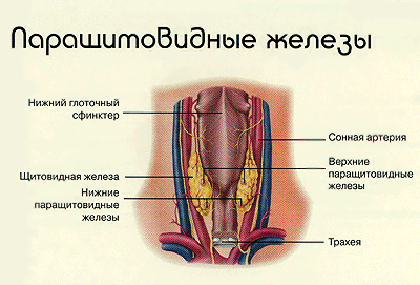Parathormone is a protein substance that is produced in the parathyroid( parathyroid) glands. This hormone is responsible for the correct exchange of calcium and phosphorus in the human body. Elevated levels of parathyroid hormone in the blood can signal serious metabolic disturbances.
The parotid( or, as they are also called, parathyroid) glands produce a hormone called parathyroid hormone. This protein substance has several synonymous names, most often using the short name "paratirin" or abbreviation of PTH.
What is parathyroid hormone, its functions

The main task of parathyroid glands is to regulate metabolic processes in the body with the help of the hormone they produce. Parathirin is one of the main tools for controlling the metabolism of phosphorus and calcium in the human body: it promotes the effective absorption of calcium by the body, preventing its excretion in the urine.
If parathyroid hormone is elevated, it means that in the body some failures have occurred. Although the intensity of the production of parathyroid hormone depends on many factors, including natural factors: for example, at night, parathyrine is released much more intensively than in the daytime. Therefore, it is not that naive to say that children grow in a dream: since the "working field" of parathyroid hormone is the formation of healthy bone tissue, it is at night that this process is most productive. In addition, this substance is part of the drugs used to treat osteoporosis. The
"Sphere of Influence" of the parathyroid hormone also covers:
- kidney,
- musculoskeletal system( bone),
- calcium absorption in the small intestine,
- carbohydrate assimilation,
- serum composition( lipid levels),
- sexual sphere( libido, potency),
- state of the epidermis( healthy skin or manifestations of dermatitis).
Why does parathyroid hormone
occur? Normally, the calcium level should be between 9 and 11 milligrams per 100 ml of blood. If there is an increase in the parathyroid hormone, this means that the body has a decrease in the level of calcium in the blood.

The human body is designed in such a way that in the case of a shortage of any substances, it urgently begins to seek the shortest ways to replenish the balance, and it does not matter whether it is internal reserves or external sources. In the case of calcium - the body is well aware of the fact that he has a lot of this good, and you need to do what is easiest to do: shift it from one place to another.
Almost all of the human calcium supply is contained in bone tissue, for other needs( for example, participation in biochemical processes), there is only one-hundredth of the total of this stock. And when the blood in the blood goes down, the body automatically starts to take it from the bones. And in this everything is also involved parathyroid hormone, the level of which is significantly increased.
If the description is simplistic, the parathyroid glands, receiving from the body a signal to lower the level of calcium in the blood, begin to produce intensively parathirin, which, in turn, "expropriates" calcium from bone tissue - transfers the desired substance from one part of the body to another.
If the parathyroid hormone is released in normal, non-urgent operation of these glands in the amount necessary to update the bone tissue, the excessive release of the hormone leads to a disruption of this balance, and osteoporosis occurs: the bone tissue is not renewed, the bones are deprived of the necessary amount of calcium, become porous andfragile.
But not necessarily an elevated level of parathyrin may be a symptom of any parathyroid gland disease: these organs may be normal, and other disorders may be the cause of hyperparathyroidism.
Other unpleasant effects of increasing the level of parathyroid hormone:
- Calcium, which in large quantities passes through the urinary system, "stuck" in the kidneys, forming stones.
- Excessive calcium in the blood settles on the walls of blood vessels. This process is called calcification and can capture the entire body, not just the cardiovascular system.
It only remains to add that the increase in the level of parathyroid hormone is called hyperparathyroidism.
Symptom of the disease and treatment

Another name for this disease is Recklinghausen's disease. Unfortunately, this disease is not so rare, it suffers from hyperparathyroidism, according to statistics, every one thousand people, and among women, the incidence is almost three times higher than among men. Sick people are not old, but on the contrary, the most that neither is able-bodied, at the age of 20 to 50 years.
How to understand that parathyroid hormone is elevated? The following symptoms are most typical in this condition:
- general weakness,
- significant decrease in muscle tone,
- strong weakness of lower extremities,
- pain localized in separate muscle groups,
- in patients with hyperparathyroidism, problems with coordination of movements and motor activity begin( get up and walk with difficulty),
- changes the nature of the gait: it becomes loose, and when walking a person as it passes from foot to foot like a duck,
- healthy teeth with intact enamel begin pand, in the absence of treatment, subsequently drop out - this is a symptom of mandibular osteoporosis,
- skin becomes dry and acquires an earthy hue,
- in severe cases, deformations of the skeleton and bone fractures are observed even from minor loads or with the slightest trauma,
- the patient experiences constant thirst andurge to urinate( this is the main reason that you need to conduct differential diagnosis with other diseases - for example, diabetes),
- develops a renal failuretatochnost which is accompanied by the formation of kidney stones and nephrocalcinosis( calcium deposition directly in the renal tissues),
- in some cases are observed behavioral changes: hysteria, irritability, a tendency to irrational tears,
- psychological fatigue, drowsiness.

The first thing to do if there is one of the symptoms or in the complex is to contact the doctor who will send for the examination.
If you do not take measures to treat hyperparathyroidism, then the most severe complication may occur - the hyperparathyroid crisis.
Symptoms observed in a patient in a crisis state:
- sudden deterioration of well-being,
- indomitable vomiting,
- severe thirst,
- any movement accompanied by severe muscular and articular pain,
- patient complains of a bolt in the abdomen,
- temperature rises to 40 degrees.
This condition may be a symptom of any disease or pathology, it is observed mainly with:
- the so-called spontaneous fractures, that is, fractures that occur for no apparent reason,
- treatment of severe infections,
- severe intoxication,
- excess calcium intakewith food,
- abnormalities in the course of pregnancy,
- treatment of the gastrointestinal tract with the use of antacids and alkalinizing medicines.

More precisely and most reliably the hyperparathyroid crisis is detected by the blood test( blood is taken from the vein).The level of calcium in the blood in this terminal state is almost twice as high as normal.
If you do not take the necessary measures, then comes the twilight of consciousness, after which the likelihood of a lethal outcome is very high: in about half the cases with severe crisis, patients die.
Treatment of hyperparathyroidism - operational.
Increase of parathyrin level in pathologies
Increase of parathyroid hormone level can be a symptom of pathological conditions:
- of parathyroid malignant tumors,
- of parathyroid gland hyperplasia,
- of chronic renal failure,
- of multiple neoplasms in internal secretion organs,
- of vitamin D deficiency and developing due tothis rickets,
- Crohn's disease and other diseases, including the gastrointestinal tract.
Medications that increase the parathyroid hormone
Some medications may cause increased production of parathyroid hormone, while other indicators will be normal.
So, the treatment of such a complex and severe disease as tuberculosis, is impossible without drug therapy. The administration of cyclosporine and isoniazid causes, in this case, an increase in the level of parathyrine in the blood.

Treatment with lithium drugs and hormone therapy( estrogens) can also cause symptoms of hyperparathyroidism.
Also increase the level of PTH cortisol, nifedipine and cortisol.



